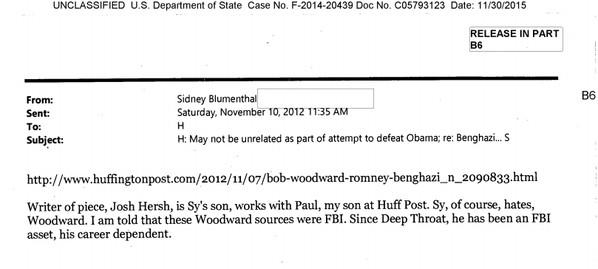Don’t you wonder why Debbie Wasserman Schultz has not challenged Hillary on this? Exactly what do those Hillary supporters know and ignore?
Judicial Watch Sues Treasury for Records on Hillary Clinton-Russian Uranium Scandal
(Washington, DC) – Judicial Watch announced today that it filed a lawsuit in the U.S. District Court for the District of Columbia seeking communications between the U.S. Department of the Treasury and former Secretary of State Hillary Clinton (Judicial Watch v. U.S. Department of the Treasury (No. 1:15-cv-01776)).
The goal of the Freedom of Information Act (FOIA) lawsuit is to gain access to documents involving a uranium deal approved by then-Secretary of State Clinton that is tied to major Clinton Foundation donor Frank Giustra and Russian-state issues.
The lawsuit was filed after the Treasury Department ignored a FOIA request sent on May 29, 2015. Judicial Watch’s request seeks emails between key Treasury agencies and Hillary Clinton non-governmental email accounts:
- All records of email communications between the Office of Foreign Assets Control and any “clintonemail.com” address, including but not limited to [email protected] and [email protected];
- All records of email communications between the Committee on Foreign Investment in the U.S. and any “clintonemail.com” address, including but not limited to [email protected] and [email protected]; and
- All records of email communications between the Office of the Secretary of the Treasury and any “clintonemail.com” address, including but not limited to [email protected] and [email protected].
Judicial Watch is investigating a controversial 2010 deal involving Uranium One, the Canadian company currently at the center of the Clinton Foundation donor scandals and ARMZ, a wholly-owned subsidiary of Rosatom, the Russian atomic energy agency, which recently took a 51 percent controlling interest in Uranium One. The lawsuit seeks information about the approval of this deal and whether the Committee on Foreign Investment in the United States (CFIUS) ignored the mandatory 75-day review approval process, approving the deal in just 52 days. Mrs. Clinton, as Secretary of State, was a member of CFIUS.
Peter Scheweizer’s book Clinton Cash first raised questions about the Uranium One deal, which benefited many donors to the Clinton Foundation, including Giustra, who, among other dealings, helped set up a Clinton Foundation entity in Canada that had the effect of hiding donations from foreign governments and others from public disclosure, despite promises of disclosure by Hillary Clinton and the Foundation.
As the New York Times reported on April 23, the Clinton Foundation hid many of the beneficiaries of the deal approved by Mrs. Clinton and CFIUS:
As the Russians gradually assumed control of Uranium One in three separate transactions from 2009 to 2013, Canadian records show, a flow of cash made its way to the Clinton Foundation. Uranium One’s chairman used his family foundation to make four donations totaling $2.35 million. Those contributions were not publicly disclosed by the Clintons, despite an agreement Mrs. Clinton had struck with the Obama White House to publicly identify all donors. Other people with ties to the company made donations as well.
And shortly after the Russians announced their intention to acquire a majority stake in Uranium One, Mr. Clinton received $500,000 for a Moscow speech from a Russian investment bank with links to the Kremlin that was promoting Uranium One stock.
At the time, both Rosatom and the United States government made promises intended to ease concerns about ceding control of the company’s assets to the Russians. Those promises have been repeatedly broken, records show.
The documents from Treasury should shed light on the apparent conflict of interest between then-Secretary of State Clinton and the Clinton Foundation regarding the expedited approval process. Under United States law, uranium is considered a strategic asset; therefore, any such deal must be approved by a committee of U.S. government officials. The CFIUS board, which is tasked with reviewing all foreign acquisitions of American national security assets, consists of seven cabinet members, including the Secretary of State and the Secretary of Treasury. In 2010, Jose W. Fernandez represented the State Department on the CFIUS board, and the documents sought by Judicial Watch lawsuit should clarify whether Clinton failed to disclose to Fernandez that several executives at Uranium One made millions of dollars in contributions to the Clinton Foundation immediately before and after CFIUS reviewed and approved the ARMZ-Uranium One deal.
Separate Judicial Watch FOIA litigation forced the disclosure last year of documents that provided a road map for over 200 conflicts-of-interest rulings that led to $48 million for the Clinton Foundation and other Clinton-connected entities during Hillary Clinton’s tenure as secretary of state. Previously disclosed documents in this lawsuit, for example, raise questions about funds Clinton accepted from entities linked to Saudi Arabia, China and Iran, among others. The August 13, 2014, investigative report that first disclosed the Clinton financial dealings, “State Department approved 215 Bill Clinton speeches, controversial consulting deal, worth $48m; Hillary Clinton’s Chief of Staff copied on all decisions,” is available here.
The approval of this deal made millions of dollars for the Clinton Foundation, gave the Russians control of one-fifth of all uranium production in the U.S., and made Rosatom one of the world’s largest uranium producers.
“Hillary Clinton’s cash and secrecy on this Russian uranium deal looks corrupt and criminal,” said Judicial Watch President Tom Fitton. “And now that his Treasury Department violated FOIA to cover up yet another Clinton scandal, there is no daylight between Barack Obama and Hillary Clinton on this scandal that placed our nation’s security at risk.”



